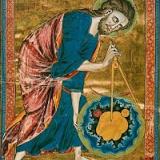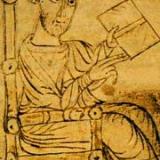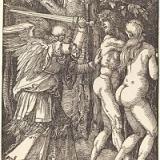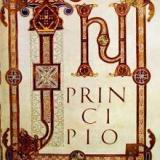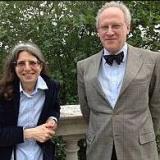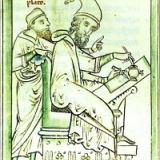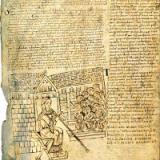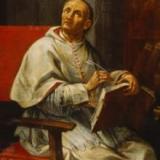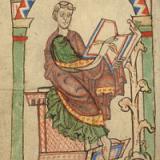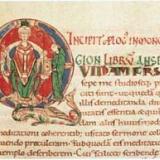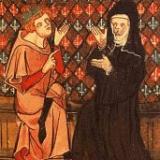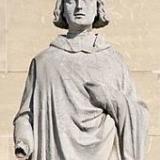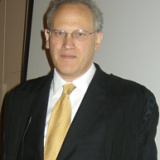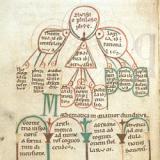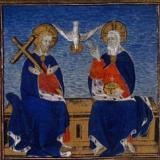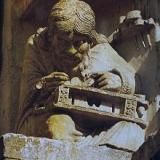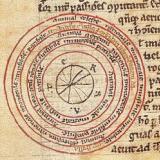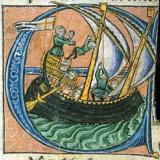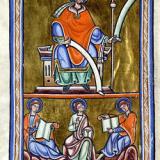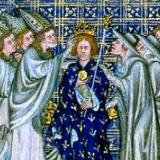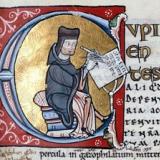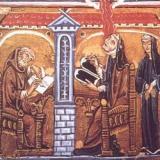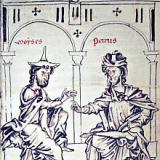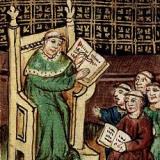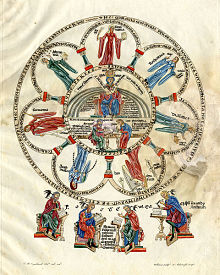Early Medieval Philosophy
The first group of episodes on medieval philosophy in Latin Christendom looks at authors and texts from the beginning of the medieval period, with Alcuin, Eriugena and other Carolingian thinkers, down to 12th century figures like Abelard, Alan of Lille, John of Salisbury and Hildegard of Bingen. Despite the reputation of the early medieval era as a "dark age" these thinkers put forth brilliant ideas concerning logic, language, metaphysics, ethics, and political philosophy. Look out for interviews with Andrew Arlig, Kent Emery, Stephen Gersh, Caroline Humfress, Jill Kraye, John Marenbon, and Eileen Sweeney.
In addition to the general bibliography on medieval philosophy provided here see for the early period:
• A.H. Armstrong (ed.) The Cambridge History of Later Greek and Early Medieval Philosophy (Cambridge: 1967).
• P. Dronke (ed.) A History of Twelfth-Century Western Philosophy (Cambridge: 1988).
• S.C. Ferruolo, The Origins of the University: the Schools of Paris and their Critics, 1100-1215 (Stanford: 1985).
• C. Giraud, A Companion to Twelfth-Century Schools (Leiden: 2020).
• D.E. Luscombe, The School of Peter Abelard (Cambridge: 1970).
• J. Marenbon, Early Medieval Philosophy (480-1150): an Introduction (London: 1988).
• R.McKitterick, Carolingian Culture: Emulation and Innovation (Cambridge: 1994).
• R.W. Southern, Scholastic Humanism and the Unification of Europe, volume 1: Foundations and volume 2: the Heroic Age (Oxford: 1995 and 2001).
Posted on
Peter launches the series of podcasts on philosophy in medieval Latin Christendom with a look ahead at what’s to come.
Posted on
Alcuin leads a resurgence of interest in philosophy and the liberal arts at the court of Charlemagne.
Posted on
John Scotus Eriugena debates free will with his rival Gottschalk, arguing that God predestines the saved but not the damned.
Posted on
Eriugena delves into the Greek tradition to produce his masterpiece of metaphysics and theology, the Periphyseon.
Posted on
We celebrate reaching episode 200 with a special double interview on the problem of defining medieval philosophy.
Posted on
Stephen Gersh (who was Peter's doctoral advisor!) joins him to discuss the sources and influence of Platonism in the Middle Ages.
Posted on
Little-known authors prepare the way for scholasticism with glosses on logic, metaphysical debate, and a poem about a cat.
Posted on
Peter Damian takes up a question with surprising philosophical implications: can God restore virginity to a woman who has lost it?
Posted on
Anselm offers more than his famous ontological argument, including a subtle account of human freedom.
Posted on
The most famous argument in medieval philosophy is Anselm’s proof for the existence of God. But how was it supposed to work?
Posted on
Anselm expert Eileen Sweeney discusses his approach to philosophy and the devotional aspect of his works.
Posted on
Peter Abelard and other logicians of the 12th century argue over the status of universals: are they words or things?
Posted on
Peter Abelard and Heloise prove themselves to be fascinating thinkers as well as star-crossed lovers.
Posted on
Peter Abelard sets out an innovative ethical theory that identifies intentions as the core of moral life.
Posted on
John Marenbon returns to the podcast to discuss Abelard's views on necessity and freedom.
Posted on
Hugh of Saint Victor and other scholars of the same abbey combine secular learning with spirituality.
Posted on
Discussion, debate and denunciation of philosophical attempts to explain the Trinity in Abelard, Richard of St Victor and Bernard of Clairvaux.
Posted on
The controversial role of Chartres in the philosophical Renaissance of the twelfth century.
Posted on
As early medieval science blossoms, Bernard Silvestris and Alan of Lille personify Nature in their philosophical prose-poems.
Posted on
In this special episode, Peter chats with the hosts of the History of the Crusades, History of Byzantium, and British History podcasts.
Posted on
Gilbert of Poitiers proposes a unique way to explain how each individual is the individual it is.
Posted on
Andrew Arlig joins Peter to discuss medieval discussions of mereology (the study of parts and wholes).
Posted on
The “Investiture Contest” between church and state and the first major work of medieval political philosophy, John of Salisbury’s Policraticus.
Posted on
Gratian and Peter Lombard help bring scholasticism to maturity by systematizing law and theology.
Posted on
A discussion about Roman law and its reception in the medieval period, with ancient law expert Caroline Humfress.
Posted on
The life, visions, political intrigues and scientific interests of Hildegard of Bingen.
Posted on
Greek and Arabic sources are rendered into Latin in a translation movement that will revolutionize medieval philosophy.
Posted on
The emergence of universities in Paris, Oxford, Bologna and elsewhere provide the main setting for medieval philosophy in the 13th century and beyond.
Posted on
Kent Emery joins Peter to discuss the effects of monastic and university culture on medieval philosophy.




